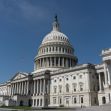A federal judge has ruled that Alina Habba, President Donald Trump’s personal lawyer, was unlawfully serving as acting U.S. attorney for the District of New Jersey, concluding that her interim authority expired in early July and that subsequent attempts to keep her in the role were invalid under federal law.
Chief Judge Matthew Brann issued the opinion on August 21 after defendants in multiple prosecutions challenged the legality of Habba’s appointment. He found that the 120-day limit on her interim service ended on July 1, 2025, under the Vacancies Reform Act. Subsequent efforts by the Justice Department to extend her tenure by designating her as a special attorney and then elevating her to first assistant U.S. attorney did not meet statutory requirements, the court said.
“Because she is not currently qualified to exercise the functions and duties of the office in an acting capacity, she must be disqualified from participating in any ongoing cases,” Brann wrote. He barred Habba from continuing in the role and warned that any prosecutor relying on her authority could face disqualification as well.
The decision has immediate effects in several high-profile cases. Brann voided Habba’s signature on a July 7 indictment against defendant Cesar Pina but declined to dismiss the charges, describing the flaw as a technical defect that did not undermine the grand jury process. He also disqualified Habba from prosecutions involving Julien Giraud Jr. and Julien Giraud III, who had argued that their indictments were invalid because she approved them after her authority expired. Judges have since postponed plea hearings and sentencing proceedings, while grand juries have temporarily paused indictments until a lawfully authorized official assumes control of the office.
The Justice Department defended its actions, arguing that the president has broad discretion to ensure continuity in leadership of vacant U.S. attorney offices. Prosecutors said the administration intended Habba to remain in charge until confirmation. Defense attorneys countered that the executive branch cannot sidestep the Senate’s constitutional role in confirming U.S. attorneys by cycling titles to extend an appointment beyond what federal law allows.
Federal law authorizes the attorney general to appoint an interim U.S. attorney for up to 120 days. If the Senate does not confirm a nominee within that period, district court judges may appoint a temporary replacement. Brann’s ruling emphasized that the Justice Department’s later measures did not restart the 120-day clock and that Habba’s authority lapsed at the statutory deadline.
Habba’s stalled nomination has also been caught in the Senate’s “blue slip” process, which allows home-state senators to block nominees. Senate Democrats have not returned blue slips in support of Habba, preventing her nomination from advancing.
Brann stressed that while signatures and approvals from an unauthorized official are defective, they do not automatically invalidate grand jury indictments unless defendants can show prejudice. The court’s opinion highlighted the importance of ensuring that every stage of a prosecution is conducted under proper legal authority, noting that administrative shortcuts cannot substitute for statutory compliance.
Habba’s status has broader implications for how administrations manage federal vacancies. The Justice Department argued that flexibility is necessary to maintain stability in key offices, but the court held that continuity cannot override statutory limits.
Habba remains disqualified from acting as U.S. attorney, and her nomination is stalled until the Senate resolves whether to consider her candidacy. The Justice Department has not announced who will lead the office while the vacancy continues. Under the statute, district judges may appoint a temporary replacement if no Senate-confirmed nominee is in place.






